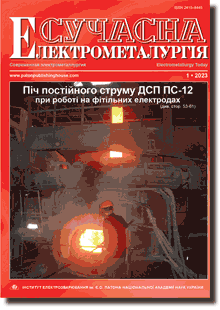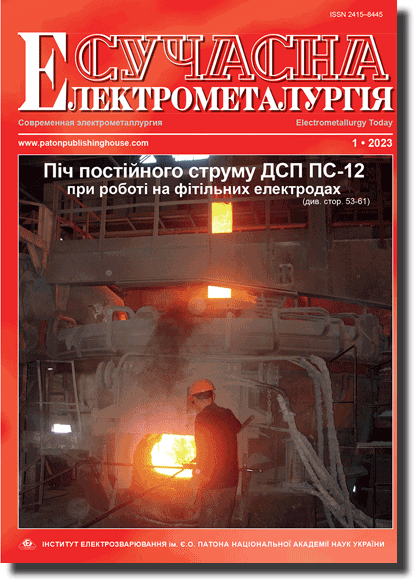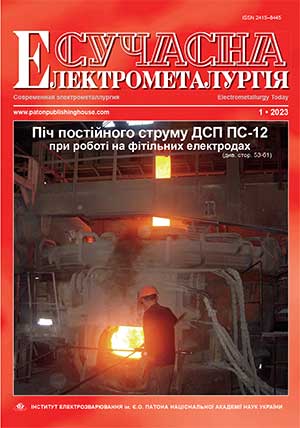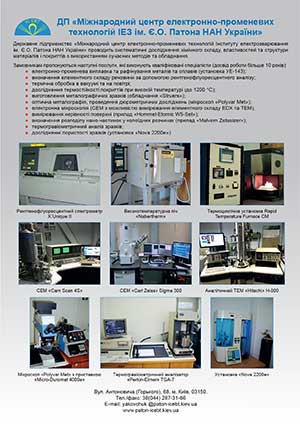| 2023 №01 (02) |
DOI of Article 10.37434/sem2023.01.03 |
2023 №01 (04) |

"Suchasna Elektrometallurgiya" (Electrometallurgy Today), 2023, #1, 16-24 pages
Electron beam technology for obtaining nanostructured silver coatings on powders of inorganic and organic substances, medicinal nanocomposite substances and their research
G.G. Didikin1, S.B. Bilous2, I.S. Kovinskyi1, O.O. Ilkov3
1E.O. Paton Electric Welding Institute of the NAS of Ukraine 11 Kazymyr Malevych Str., 03150, Kyiv, Ukraine. E-mail: office@paton.kiev.ua2Danylo Halytsky Lviv National Medical University. 69 Pekarska Str., 79010, Lviv, Ukraine.
3Institute of Animal Biology of the National Academy of Sciences of Ukraine. 38 Vasyl Stus Str., 79034, Lviv, Ukraine.
Abstract
The technological schemes of the process of electron beam evaporation and condensation and examples of their use for the synthesis of nanocomposites based on inorganic and organic carriers, as well as methodological and experimental development of antimicrobial substances based on Ag nanoparticles are considered. The biological and physicochemical properties of silver nanoparticles and the effectiveness of antimicrobial action of a composite with silver nanoparticles on the surface of a medical product were evaluated. Examples of possible use of antimicrobial drugs for medical purposes are given. The bactericidal effect of the composite against representatives of opportunistic pathogens that can cause hospital-acquired infections was revealed. Evaluation of the antimicrobial and cytotoxic effects of composites containing silver nanoparticles, allows us recommending it for the development of prophylactic and therapeutic agents in various forms of release for external and internal use. Ref. 7, Tabl. 1, Fig. 14.
Keywords: electron beam physical deposition in vacuum; silver; nanoparticles; X-ray phase analysis; scanning electron microscopy; transmission electron microscopy; dynamic light scattering; bactericidality; cytotoxicity; metronidazole; levofloxacin
Received 01.11.2022
References
1. Moskalenko, V.F., Rosenfeld, L.G., Movchan, B.O., Chekman, I.S. (2008) Nanotechnology, nanomedicine, nanopharmacology: State, prospects of scientific research, implementation in medical practice. Proc. of Ist National Conf. on Man and Medicine - Ukraine, Kyiv, 167-168 [in Ukrainian].2. Raheman, F., Deshmukh, S., Ingle, A. et al. (2011) Silver nanoparticles: Novel antimicrobial agent synthesized from an endophytic fungus pestalotia sp. isolated from leaves of Syzygiumcumini (L). Nano Biomed Eng., 3(3), 174-178. https://doi.org/10.5101/nbe.v3i3.p174-178
3. Trakhtenberg, I.M., Ulberg, Z.R., Chekman, I.S. et al. (2013) Methodological recommendations «Assessment of safety of medicinal products». Kyiv [in Ukrainian].
4. Morones-Ramirez, J.R., Winkler, J.A., Spina, C.S. et al. (2013) Silver enhances antibiotic activity against gram-negative bacteria. Sci. Transl. Med., 190(5), 1-21. https://doi.org/10.1126/scitranslmed.3006276
5. Ershov, B.G. (2001) Metal nanoparticles in aqueous solutions: Electronic, optical, and catalytic properties. J. of the D.I. Mendeleev Russian Chemical Society, 14(3), 20-30 [in Russian].
6. Christian, P., Kammer, V., Balousha, Р., Hofman, Th. (2008) Nanoparticles: Structure, properties, preparation and behavior in environmental media. Ecotoxicology, 17, 326-343. https://doi.org/10.1007/s10646-008-0213-1
7. Ilkov, O., Manko, N., Bilous, S. et al. (2021) Antibacterial and cytotoxic activity of metronidazole and levofloxacin composites with silver nanoparticles. Current Issues of Pharmacy and Medical Sci., 34(4), 224-228. https://doi.org/10.2478/cipms-2021-0040
Advertising in this issue:
The cost of subscription/purchase order journals or individual articles
| Journal/Currency | Annual Set | 1 issue printed |
1 issue |
one article |
| TPWJ/USD | 384 $ | 32 $ | 26 $ | 13 $ |
| TPWJ/EUR | 348 € | 29 € | 24 € | 12 € |
| TPWJ/UAH | 7200 UAH | 600 UAH | 600 UAH | 280 UAH |
| AS/UAH | 1800 UAH | 300 UAH | 300 UAH | 150 UAH |
| AS/USD | 192 $ | 32 $ | 26 $ | 13 $ |
| AS/EUR | 180 € | 30 € | 25 € | 12 € |
| SEM/UAH | 1200 UAH | 300 UAH | 300 UAH | 150 UAH |
| SEM/USD | 128 $ | 32 $ | 26 $ | 13 $ |
| SEM/EUR | 120 € | 30 € | 25 € | 12 € |
| TDNK/UAH | 1200 UAH | 300 UAH | 300 UAH | 150 UAH |
| TDNK/USD | 128 $ | 32 $ | 26 $ | 13 $ |
| TDNK/EUR | 120 € | 30 € | 25 € | 15 € |
AS = «Automatic Welding» - 6 issues per year;
TPWJ = «PATON WELDING JOURNAL» - 12 issues per year;
SEM = «Electrometallurgy Today» - 4 issues per year;
TDNK = «Technical Diagnostics and Non-Destructive Testing» - 4 issues per year.









